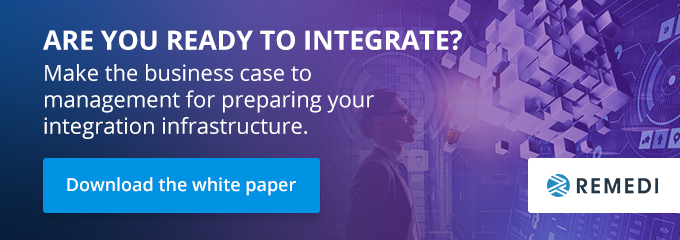
Electronic Data Interchange (EDI) has been around for decades, enabling business data transactions in numerous industries. Over the years, many influencing factors have emerged to challenge its footing in B2B communications. Still, EDI has grown in adoption and acceptance, becoming deeply ingrained in everyday business interactions. In 2019, EDI accounted for 78.4 percent of all B2B digital transactions.
However, as markets evolve and new technologies emerge, EDI's place in business supply chains is increasingly coming into question. Fortunately, current industry trends can help us picture what may lie on the horizon for this long-standing solution.
In this article, we discuss four key B2B integration trends that stand to impact EDI providers and EDI integration in the future:
- Skills Shortage
- E-commerce Expansion
- Business System Integration
- Blockchain Growth
Skills Shortage
Cloud computing is reinventing EDI technology deployment. Today, more and more businesses are turning to cloud-based platforms as cheaper and more convenient solutions for data storage, applications, and connections. The revolution has caught up with EDI. As businesses increasingly look to improve IT agility and flexibility, cloud EDI is steadily taking precedent over traditional EDI mechanisms.
However, the exponential growth in cloud computing has led to a surge in demand for good IT talent. Companies are looking for skills that typically require years to develop in a talent market that has just begun embracing cloud technologies.
According to the London School of Economics, a lack of cloud skills costs businesses $258 million annually. While cloud-based platforms provide elasticity, flexibility, and cost-saving opportunities, enterprises are unlikely to make successful cloud migrations if they lack the right internal resources. A successful cloud EDI upgrade requires a solid cloud-first strategy developed and implemented by skilled IT staff.
IT departments have dramatically turned to outsourced resources to close the skills gap within office walls. Partnering with external IT teams has proven effective at meeting cloud migration targets with minimal costs and uninterrupted support. By outsourcing the EDI integration skillset, organizations can plan for integration without worrying about building internal competency.
E-commerce Expansion
E-commerce is by far the faster-growing retail sector. Thanks to rapid digitization and increasing demand for convenience, and most recently, pandemic-induced lockdowns and quarantine measures, online shopping has become a way of life. Consequently, virtually all traditional brick-and-mortar companies are considering venturing into e-commerce to expand revenue streams or at least survive current market disruptions.
However, the e-commerce explosion presents the unprecedented challenge of managing increasingly complex and voluminous enterprise data. Furthermore, the typical e-commerce model integrates with numerous disparate technologies, from supply chain management platforms to data, application, and B2B integration capabilities, resulting in an exceedingly complex ecosystem.
E-commerce data comes in all forms, from different suppliers, customers, and partners. As a result, businesses must invest in solutions that facilitate seamless data access, integration, and management to derive valuable insights and keep environments digitally secure. Therefore, a modern approach to integrating legacy systems is more critical than ever before.
Data volumes and complexities are bound to get even more overwhelming down the road, pushing current technologies beyond their limits. Your business must be ready and willing to embrace future-proof integration platforms that enable fast and secure multi-enterprise connections across a wide variety of standards and protocols.
Business System Integration
Market disruptions and increasing competition are forcing companies to abandon rigid multi-enterprise connectivity approaches in favor of agile integration models that associate numerous IT systems, services, and software and enable them to work seamlessly together. Robust business system integration enhances information flow and reduces operational costs.
As the foundation of system connectivity, EDI is the integration technology of choice for most industry-specific supply chains.
Integrating EDI provides extensive data capabilities, some of which include:
- Any-to-any format transformation and data integration
- Intelligent automation with comprehensive data orchestration
- Real-time synchronous and asynchronous transactions
- Holistic visibility for various operational and business intelligence use cases
- Support for on-premise and cloud data, applications, systems, and partners.
Business system integration is critical for developing an agile enterprise that can survive and thrive in today's increasingly dynamic markets. With EDI, your business can connect all revenue-generating processes, data, applications, and partners and ensure uninterrupted communication between disparate systems.
Blockchain Growth
The last decade was remarkable for blockchain. Within a short period, blockchain use cases evolved from merely powering cryptocurrency to enabling all sorts of digital transactions. Meanwhile, pioneering cryptos like Bitcoin and Ethereum skyrocketed in value, ushering in a volatile age of speculative investing and overnight success stories.
Blockchain's appeal stems from its ability to facilitate secure, verifiable peer-to-peer digital interactions. With blockchain protocols, two parties can instantaneously transfer anything, from tokens to data, without third-party facilitation. This aspect makes blockchain a hot topic in today's increasingly connected world, where secure, cost-effective integration is critical for business success. Some industry experts are even going as far as claiming that blockchain will replace EDI as the universal standard for multi-enterprise integration.
However, although blockchain has proven its value in some applications, it will not replace all B2B integration technologies. More likely, blockchain solutions will augment existing EDI platforms and work hand-in-hand to deliver integration.
Therefore, the current models of B2B transactions do not necessarily need to change drastically – if at all – in anticipation of a blockchain-powered future. Instead, they only need to accept blockchain as an augmented solution that increases visibility between transacting parties and makes EDI more powerful.
Are you well-aligned with current trends?
Most businesses incorporate at least one form of multi-enterprise integration. However, many remain inadequately versed in EDI and EDI integration and are grossly unprepared for current and future disruptions.
Remedi is the expert in enterprise ecosystem integration. Over the years, we have enabled many businesses to connect and integrate their core revenue-generating procedures and achieve the agility and flexibility required to survive and thrive in an ever-changing market.
Remedi prides itself in helping customers keep pace with EDI and integration trends and demands and respond effectively to risks and opportunities.



